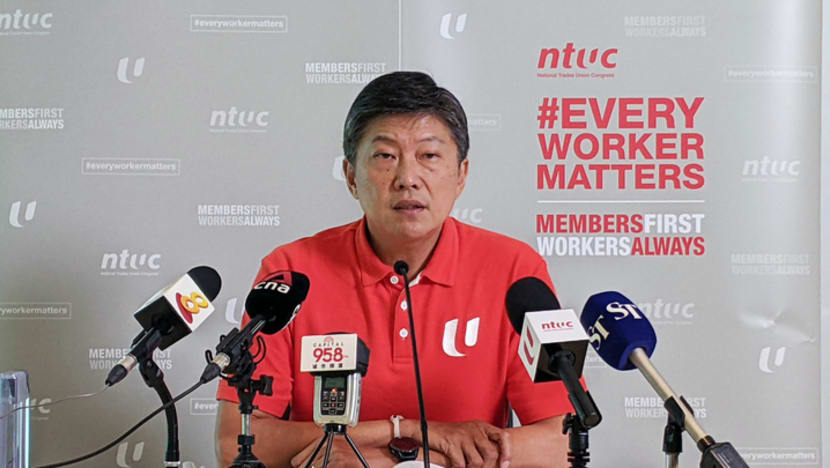NTUC to look more closely in 2022 at youth entering workforce, women juggling family duties

Mr Ng Chee Meng, secretary-general of the National Trades Union Congress, at a media briefing on Feb 7, 2022.
SINGAPORE — While traditionally focused on addressing the needs of low-wage, vulnerable and older workers, the labour movement has plans to expand its reach this year to look more closely at youth entering the workforce and women workers juggling family responsibilities.
At a media briefing on Monday (Feb 7), labour chief Ng Chee Meng said that the National Trades Union Congress (NTUC) can work with schools to ensure that youth have experiences that go beyond just a school internship.
NTUC will also try to support women workers, who also have family responsibilities, with flexible work arrangements, he added.
Mr Ng was laying out the unions' plans for the year in a climate where Singapore's economy and labour market are showing signs of improvement after being battered for the past two years due to the Covid-19 pandemic, while facing a faster-than-usual increase in the cost of living.
The plans that NTUC has for youth and women are still in the "early days" and there are not many details that are ready, Mr Ng said.
However, in regard to youth, he talked about how union officers may mentor student interns and show them the various career pathways in a company beyond just a school internship posting.
Besides gaining practical hands-on work experience whereby youth may apply what they learnt in school at the workplace, they will also be receiving support and guidance throughout the internship from a labour movement mentor or supervisor.
He said that the union movement may also continue keeping in touch with male youth who have to serve National Service after they graduate from school, ensure that they do not forget the skills they have learned and help them get a job at the company they interned with after they complete their service.
In a media release on Monday, NTUC said that it plans to partner schools, such as the Institute of Technical Education, to direct youth to companies that have real placement opportunities for fresh graduates. These include companies in sectors such as healthcare, biotechnology and chemical process technology.
"Besides gaining practical hands-on work experience whereby youth may apply what they learnt in school at the workplace, they will also be receiving support and guidance throughout the internship from a labour movement mentor or supervisor," the union added.
As for women workers juggling career and family obligations, Mr Ng said that the problem is a complex one.
But he added that the union is advocating for these female workers to have flexible work arrangements, although no details were given as to how it was engaging with companies.
In its media statement, NTUC said that women who wish to return to work would require various forms of support, including mindset and skills training before they are being matched to hiring companies.
Beyond youth and women, Mr Ng said that NTUC will continue its work of previous years with low-wage workers, professionals, managers and engineers (PMEs), gig workers, as well as older workers who face difficulties finding another job.
Building on the various training programmes it has launched, the labour movement is also looking at setting up tripartite training academies this year, which Mr Ng describes as an "end-to-end one-stop service" for companies that are look to transform themselves.
There is no specific timeline as to the number of training academies the labour movement is looking to set up by the end of the year, Mr Ng said.
However, NTUC is exploring to see if sectors that are still struggling due to the pandemic, such as the tourism and hospitality industry, can benefit from sector-wide capabilities to be taught at these academies.
The labour movement has also started discussions with the Singapore Tourism Board to pilot a career hub for the tourism sector, NTUC said in its statement.
Mr Ng acknowledged that higher costs of living this year would be a concern among many workers in Singapore, and that having a good job is important to counter these challenges.
"The best way to beat inflation and costs of living as a sustainable strategy has always been (to raise) our productivity and (thereby, keep) our workers in pace with changes in cost," he said.
He added that NTUC FairPrice supermarket will announce initiatives to help workers cope with the increased costs of living soon.















